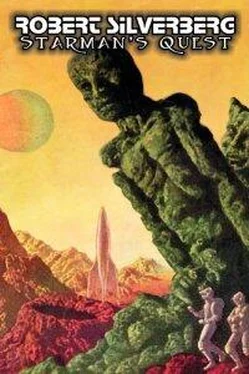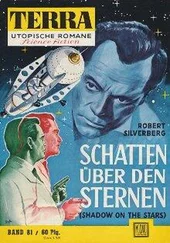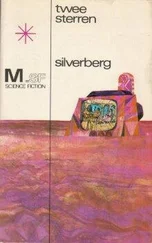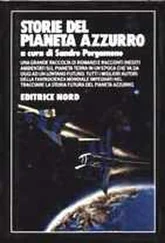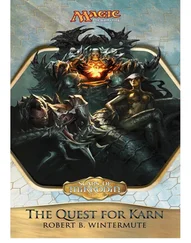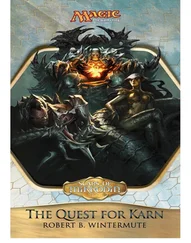Robert Silverberg - Starman's Quest
Здесь есть возможность читать онлайн «Robert Silverberg - Starman's Quest» весь текст электронной книги совершенно бесплатно (целиком полную версию без сокращений). В некоторых случаях можно слушать аудио, скачать через торрент в формате fb2 и присутствует краткое содержание. Год выпуска: 1958, Издательство: Gnome Press, Жанр: Фантастика и фэнтези, на английском языке. Описание произведения, (предисловие) а так же отзывы посетителей доступны на портале библиотеки ЛибКат.
- Название:Starman's Quest
- Автор:
- Издательство:Gnome Press
- Жанр:
- Год:1958
- ISBN:нет данных
- Рейтинг книги:3 / 5. Голосов: 1
-
Избранное:Добавить в избранное
- Отзывы:
-
Ваша оценка:
- 60
- 1
- 2
- 3
- 4
- 5
Starman's Quest: краткое содержание, описание и аннотация
Предлагаем к чтению аннотацию, описание, краткое содержание или предисловие (зависит от того, что написал сам автор книги «Starman's Quest»). Если вы не нашли необходимую информацию о книге — напишите в комментариях, мы постараемся отыскать её.
Starman's Quest — читать онлайн бесплатно полную книгу (весь текст) целиком
Ниже представлен текст книги, разбитый по страницам. Система сохранения места последней прочитанной страницы, позволяет с удобством читать онлайн бесплатно книгу «Starman's Quest», без необходимости каждый раз заново искать на чём Вы остановились. Поставьте закладку, и сможете в любой момент перейти на страницу, на которой закончили чтение.
Интервал:
Закладка:
Alan wanted to go over to them and tell them, “That’s my ship. Me. Alan Donnell.” But he knew they would only laugh. Tall boys not quite nineteen did not own late-model Spacemasters with price-tags of cr. 225,000.
He itched to get off-planet with it, but there were more delays. He needed a flight ticket, first, and even though he had had the necessary grounding in astrogation technique and spacepiloting as an automatic part of his education aboard the Valhalla , he was rusty, and needed a refresher course that took six weary months.
After that came the physical exams and the mental checkup and everything else. Alan fumed at the delay, but he knew it was necessary. A spaceship, even a small private one, was a dangerous weapon in unskilled hands. An out-of-control spaceship that came crashing to Earth at high velocity could kill millions; the shock wave might flatten fifty square miles. So no one was allowed up in a spaceship of any kind without a flight ticket—and you had to work to win your ticket.
It came through, finally, in June of 3879, a month after Alan’s twentieth birthday. By that time he had computed and recomputed his orbit to Venus a hundred different times.
Three years had gone by since he last had been aboard a spaceship, and that had been the Valhalla . His childhood and adolescence now seemed like a hazy dream to him, far in the back of his mind. The Valhalla , with his father and Steve and all the friends of his youth aboard, was three years out from Earth—with seven years yet to go before it reached Procyon, its destination.
Of course, the Crew had experienced only about four weeks, thanks to the Fitzgerald Contraction. To the Valhalla people only a month had passed since Alan had left them, while he had gone through three years.
He had grown up, in those three years. He knew where he was heading, now, and nothing frightened him. He understood people. And he had one great goal which was coming closer and closer with each passing month.
Blastoff day was the fifth of September, 3879. The orbit Alan finally settled on was a six-day trip at low acceleration across the 40,000,000-odd miles that separated Earth from Venus.
At the spaceport he handed in his flight ticket for approval, placed a copy of his intended orbit on file with Central Routing Registration, and got his field clearance.
The ground crew had already been notified that Alan’s ship was blasting off that day, and they were busy now putting her in final departure condition. There were some expressions of shock as Alan displayed his credentials to the ground chief and climbed upward into the control chamber of the ship he had named the James Hudson Cavour , but no one dared question him.
His eyes caressed the gleaming furnishings of the control panel. He checked with the central tower, was told how long till his blastoff clearance, and rapidly surveyed the fuel meters, the steering-jet response valves, the automatic pilot. He worked out a tape with his orbit on it. Now he inserted it into the receiving tray of the autopilot and tripped a lever. The tape slid into the computer, clicking softly and emitting a pleasant hum.
“Eight minutes to blastoff,” came the warning.
Never had eight minutes passed so slowly. Alan snapped on his viewscreen and looked down at the field; the ground crew men were busily clearing the area as blastoff time approached.
“One minute to blastoff, Pilot Donnell.” Then the count-down began, second by second.
At the ten-seconds-to-go announcement, Alan activated the autopilot and nudged the button that transformed his seat into a protective acceleration cradle. His seat dropped down, and Alan found himself stretched out, swinging gently back and forth in the protecting hammock. The voice from the control tower droned out the remaining seconds. Tensely Alan waited for the sharp blow of acceleration.
Then the roaring came, and the ship jolted from side to side, struggled with gravity for a moment, and then sprang up free from the Earth.
Some time later came the sudden thunderous silence as the jets cut out; there was the dizzying moment of free fall, followed by the sound of the lateral jets imparting longitudinal spin to the small ship. Artificial gravity took over. It had been a perfect takeoff. Now there was nothing to do but wait for Venus to draw near.
The days trickled past. Alan experienced alternating moods of gloom and exultation. In the gloomy moods he told himself that this trip to Venus was a fool’s errand, that it would be just another dead end, that Cavour had been a paranoid madman and the hyperspace drive was an idiot’s dream.
But in the moments of joy he pictured the finding of Cavour’s ship, the building of a fleet of hyperdrive vessels. The distant stars within almost instantaneous reach! He would tour the galaxies as he had two years ago toured Earth. Canopus and Deneb, Rigel and Procyon, he would visit them all. From star to bright star, from one end of the universe to the other.
The shining oval of Venus grew brighter and brighter. The cloud layer that enveloped Earth’s sister planet swirled and twisted.
Venus was virtually an unknown world. Earth colonies had been established on Mars and on Pluto, but Venus, with her harsh formaldehyde atmosphere, had been ignored. Uninhabited, uninhabitable, the planet was unsuitable for colonization.
The ship swung down into the cloud layer; floating wisps of gray vapor streamed past the orbiting Cavour . Finally Alan broke through, navigating now on manual, following as best he could Cavour’s old computations. He guided the craft into a wide-ranging spiral orbit three thousand feet above the surface of Venus, and adjusted his viewscreens for fine pickup.
He was orbiting over a vast dust-blown plain. The sky was a fantastic color, mottled blues and greens and an all-pervading pink, and the air was dull gray. No sun at all penetrated the heavy shroud of vapor that hung round the planet.
For five hours he scouted the plain, hoping to find some sign of Cavour’s habitation. It was hopeless, he told himself; in thirteen hundred years the bitter winds of Venus would have destroyed any hint of Cavour’s site, assuming the old man had reached Venus successfully.
But grimly Alan continued to circle the area. Maybe Cavour had been forced to land elsewhere, he thought. Maybe he never got here. There were a million maybes.
He computed his orbit and locked the ship in. Eyes pressed to the viewscreen, he peered downward, hoping against hope.
This trip to Venus had been a wild gamble from the start. He wondered if Max Hawkes would have covered a bet on the success of his trip. Max had been infallible when it came to hunches.
Well , Alan thought, now I’ve got a hunch. Help me one more time, Max, wherever you are! Lend me some of your luck. I need it, Max.
He circled once more. The Venusian day would last for three weeks more; there was no fear of darkness. But would he find anything?
What’s that?
He leaped to the controls, switched off the autopilot, and broke out of orbit, going back for a return look. Had there been just the faintest metallic glint below, as of a spaceship jutting up from the sand?
Yes.
There was a ship down there, and a cave of some sort. Alan felt strangely calm. With confident fingers he punched out a landing orbit, and brought his ship down in the middle of the barren Venusian desert.
Chapter Eighteen
Alan brought the Cavour down less than a mile away from the scene of the wreckage—it was the best he could do, computing the landing by guesswork—and climbed into his spacesuit. He passed through the airlock and out into the windswept desert.
Читать дальшеИнтервал:
Закладка:
Похожие книги на «Starman's Quest»
Представляем Вашему вниманию похожие книги на «Starman's Quest» списком для выбора. Мы отобрали схожую по названию и смыслу литературу в надежде предоставить читателям больше вариантов отыскать новые, интересные, ещё непрочитанные произведения.
Обсуждение, отзывы о книге «Starman's Quest» и просто собственные мнения читателей. Оставьте ваши комментарии, напишите, что Вы думаете о произведении, его смысле или главных героях. Укажите что конкретно понравилось, а что нет, и почему Вы так считаете.
